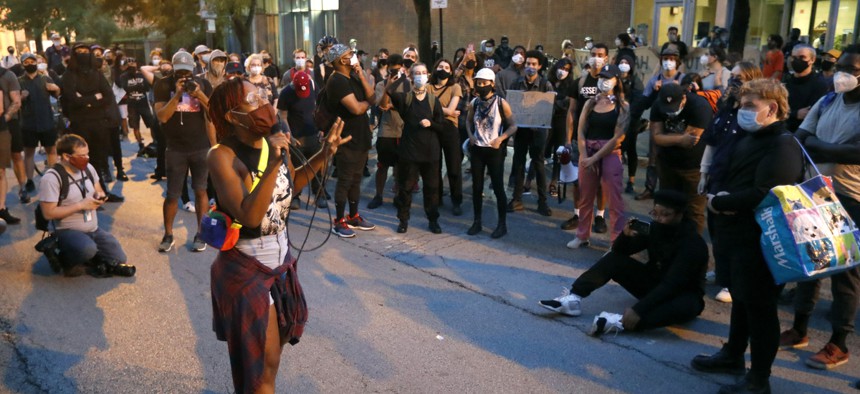Protests Arrive Outside Mayors’ Front Doors

A protest in Chicago on August 10. Recently, protesters have been blocked from demonstrating in front of Mayor Lori Lightfoot's home. AP Photo/Charles Rex Arbogast

Connecting state and local government leaders
The homes of public officials have become magnets for protests. Not all mayors are pleased.
Protesters calling for racial justice and changes to their cities’ police departments are taking their message to mayors’ front doors. In the past few weeks, demonstrators in several cities across the country appeared outside mayors’ homes—a tactic that some mayors say goes too far.
Demonstrators assembled outside Pittsburgh Mayor Bill Peduto’s house several nights this week, making noise with drums, horns and chants. Peduto initially responded with support for those who were trying to enlist his help to release a 25-year-old protester who was arrested by plainclothes officers in an unmarked van last weekend, with the mayor calling the arrest “disturbing." But after a 15-hour demonstration outside his home Tuesday night, which at one point swelled to 300 people and led to one arrest, Peduto said that the protest “crosses a line.”
“I have long defended First Amendment rights to peaceably protest. What I cannot defend is any neighborhood in our city—and their residents and families—being disturbed through the night and morning, and a peaceful protest devolving into unacceptable conduct in which residents are being harassed and threatened,” he said.
Other mayors have similarly seen protests arrive on their doorsteps. Activists calling for better services for homeless residents of Washington, D.C. marched to Mayor Muriel Bowser’s residence this week. In late July, Oakland Mayor Libby Schaaf’s house was vandalized with messages like “Wake up Libby” and “Blood on your hands.”
Mayors aren’t the only public officials whose homes have become frequent sites for protests. Seattle Police Chief Carmen Best, who recently announced her resignation after the city council cut her department’s budget, also saw several demonstrations outside her home this month. And 87 protesters who stood outside the home of Kentucky Attorney General Daniel Cameron demanding justice for Breonna Taylor, a woman who police shot and killed while she slept in her apartment in March, were arrested and charged with felonies for “intimidating a participant in a legal process.”
Protesters in many of these cities say that bringing their demonstrations to officials’ front doors is the only way to get them to listen.
Chicago Mayor Lori Lightfoot doesn’t approve. Following numerous recent protests outside her home, a police barricade was set up on the block, preventing demonstrators from getting near her house. The 140 officers stationed on the street corners have been ordered to arrest any protesters who refuse to leave and to keep the area “locked down.” One neighbor dubbed the block “Fort Lori.”
When activists criticized the use of police on her block, saying it stymied their ability to assemble, Lightfoot defended the police presence. During a press conference on Thursday, she said that she and her wife have received daily threats that necessitate the increased security, though she did not go into specifics when asked what type of threats they were.
“I think that residents of this city, understanding the nature of the threats that we are receiving on a daily basis … understand I have a right to make sure that my home is secure,” she said. “I make no apologies whatsoever for that.”
The legality of barricading an entire block is somewhat hazy. In a statement, a spokesperson for the American Civil Liberties Union of Illinois, Ed Yohnka, said that the “government can prohibit protests at a single home in a residential area” but not necessarily an entire block. “The right to free speech and peaceable assembly includes the right to choose one’s audience, and government actions that limit that right for the sake of residential privacy must be narrowly tailored to protect that interest,” he said.
In other places, however, officials seem eager to engage with protesters when they show up.
Seattle Deputy Mayor Mike Fong came outside his home to speak with protesters recently. When the demonstration arrived on his block, he said, “Right here … I am Mike Fong. Let’s talk.”
Last Friday, New Haven, Connecticut Mayor Justin Elicker had an hour-long conversation with students and young people who came to protest outside his house. One organizer of the protest, Jeremy Cajigas, told the mayor that the demonstrators “appreciate you coming out to give us some clear answers,” even if the two sides didn’t agree.
Emma Coleman is the assistant editor for Route Fifty.

NEXT STORY: One State Launches Online Tool to Help Residents Gauge Risk of Exposure to Covid-19





